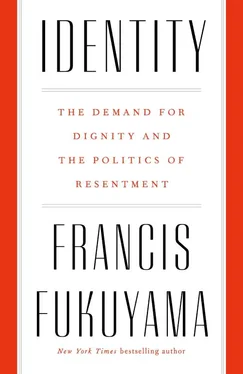Rousseau says that private property emerged with the discovery of metallurgy and agriculture; while making humans incomparably richer, the ability to accumulate property also vastly exaggerated natural differences between individuals and raised jealousy, envy, pride, and shame to new heights. Hence Rousseau’s famous injunction at the beginning of the second part of the Discourse :
The first person who, having enclosed some land, took it upon himself to say “This is mine,” and found people simple-minded enough to believe him, was the true founder of civil society… How many crimes, wars, murders, miseries and horrors, would that man have saved the human species, who pulling up the stakes or filling up the ditches should have cried to his fellows: Don’t listen to this imposter; you are lost, if you forget that the fruits of the earth belong equally to us all, and the earth to nobody! {8} 8 Ibid., 165.
Rousseau had two separate prescriptions for walking mankind back out of this catastrophe of inequality and violence. The first was outlined in The Social Contract , a political solution in which citizens return to their natural equality through the emergence of a “general will” that unites them in republican virtue. They cooperate with one another in a political union, but one that brooks no disagreement or pluralism. This solution has been rightly criticized as proto-totalitarian, quashing diversity and requiring strict uniformity of thought.
The second prescription is not political but plays out on an individual level. In his late work Reveries of a Solitary Walker , Rousseau tries to recover the state of consciousness of the first man—that is, humans as they were prior to the discovery of society. In the Discourse on Inequality , he had said that “the first sentiment of Man was that of his existence”; the sentiment de l’existence returns in the Reveries as a feeling of plenitude and happiness that emerges as an individual seeks to uncover the true self hiding beneath the layers of acquired social sensibilities. {9} 9 Jean-Jacques Rousseau, Les rêveries du promeneur solitaire (Paris: Éditions Garnier Frères, 1960), 17. Author’s translation.
Rousseau’s sentiment of existence would one day morph into what is now called lived experience, which lies at the root of contemporary identity politics.
Rousseau thus stakes out a distinctive position regarding human nature. He disputes the assertion of Thomas Hobbes that man in the state of nature was violent, cruel, and selfish; Rousseau also disagrees with John Locke that private property was natural to early man. He would also disagree with Socrates and Adeimantus that thymos was a constituent part of the human soul, since Rousseau asserts clearly that the emotion of pride, and hence the desire to be recognized by other people, did not exist for the earliest human beings.
What Rousseau asserts, and what becomes foundational in world politics in the subsequent centuries, is that a thing called society exists outside the individual, a mass of rules, relationships, injunctions, and customs that is itself the chief obstacle to the realization of human potential, and hence of human happiness. This way of thinking has become so instinctive to us now that we are unconscious of it. It is evident in the case of the teenager accused of a crime who raises the defense “Society made me do it,” or of the woman who feels that her potential is being limited by the gendered and sexist society around her. On a larger scale, it is evident in the complaints of a Vladimir Putin who feels the American-led international order wrongly disrespects Russia, and who then seeks to overturn it. While earlier thinkers could critique aspects of existing social rules and customs, few argued that existing society and its rules needed to be abolished en masse and replaced by something better. This is what ultimately links Rousseau to the revolutionary politics of France in 1789, or Russia in 1917, or China in 1949.
Like Luther, Rousseau establishes a sharp distinction between the inner self and the outer society demanding conformity to its rules. Unlike Luther, however, the freedom of that inner individual does not lie only in his or her ability to accept the grace of God; rather, it lies in the natural and universal ability to experience the sentiment de l’existence , free of the layers of accumulated social convention. Rousseau thus secularized and generalized the interiority opened up by Luther, accomplished through an exploration of Rousseau’s innermost feelings that was as anguished and prolonged as that of the Augustinian friar. According to Charles Taylor, “This is part of the massive subjective turn of modern culture, a new form of inwardness, in which we come to think of ourselves as beings with inner depths.” {10} 10 Charles Taylor, The Ethics of Authenticity (Cambridge, MA: Harvard University Press, 1992), 26.
Rousseau’s secularization of the inner self, and the priority he gives it over social convention, is thus a critical stepping-stone to the modern idea of identity. But Rousseau, as we have seen, did not believe that the desire for recognition was natural to human beings. He argued that the emotion of pride and the proclivity to compare oneself to others did not exist among early human beings, and that their emergence in human history laid the foundation for subsequent human unhappiness. The recovery of the inner self thus required divesting oneself of the need for social recognition; the solitary dreamer does not need anyone’s approval.
We might note how, given our present knowledge of early human societies and of human evolution, Rousseau was profoundly right about certain things, and profoundly wrong about others. He was largely correct in his description of the broad stages of human social evolution, tracing the transitions from what we would now call hunter-gatherer to agrarian and then to commercial societies. He was also correct in his emphasis on the importance of the discovery of agriculture: how it led to the institution of private property, and to agrarian societies that were far more unequal and hierarchical than the hunter-gatherer ones they displaced. {11} 11 Rousseau’s belief that sex was natural but not the family does not seem to be true of behaviorally modern human beings. It is true, however, of modern chimpanzees and may well have been true of the presumed chimplike progenitor of modern humans.
But Rousseau was wrong about some important things, beginning with his assertion that early humans were primordially individualistic. We know he was wrong, first because we see no archaeological or anthropological evidence of presocial human beings, and second because we know with high confidence that the primate ancestors of modern human beings were themselves highly social. Existing primates have complex social structures along with, evidently, the emotional faculties needed to sustain them. {12} 12 For a more detailed treatment of this topic, see Fukuyama, Origins of Political Order , 26–38.
Rousseau’s assertion that pride emerged only at a certain stage of social evolution is curious; it begs the question of how such an intrinsic human feeling could spontaneously appear in response to an external stimulus. If pride were socially constructed, young children would have to be somehow trained to experience it, yet we do not observe this happening to our children. Today we know that feelings of pride and self-esteem are related to levels of the neurotransmitter serotonin in the brain, and that chimpanzees exhibit elevated levels of serotonin when they achieve alpha male status. {13} 13 Frank, Choosing the Right Pond , 21–25.
It seems unlikely that there was ever a moment when behaviorally modern human beings did not compare themselves with one another or feel pride when they received social recognition. In this respect, Plato had a better understanding of human nature than Rousseau.
Читать дальше












